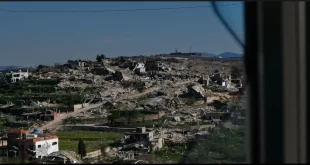Mar 10, 2015, Sputnik News
The Al-Nusra Front is allegedly considering abandoning its Al-Qaeda affiliation in exchange for Qatari support.
The media was alight with talk over the past week that Al-Nusra Front, an al-Qaeda affiliate, would switch sides in the War on Syria in order to support ‘the good guys’, in this case, Qatar. Although the terrorist group has reaffirmed its allegiance to Bin Laden’s successors, thereby squashing the speculation, the rumors are important because of what they reveal about Qatar’s role in Syria, as well as that of the entire ‘anti-ISIL’ coalition. The fact that a member of the ‘anti-terrorist’ campaign would even consider siding with terrorists, and that the rest of the coalition would silently support this, is an implicit admission that the US and its allies truly do believe that the ‘ends justify the means’, and that recruiting terrorists is permissible if it’s for pursuing regime change.
‘Pac-Man’
Al-Nusra is notorious in the West, not for the terrorist acts that it commits (which are rarely mentioned), but for the fact that it’s been gobbling up more and more ‘moderate opposition’ groups, most recently Harakat Hazm, the first organization to receive US antitank missiles since they were officially issued last year.
It’s ironic that in the same week that the media was talking about how the brutal al-Qaeda affiliate was responsible for the dismantling of such a symbolic regime change group, they were praising Qatar for considering an alliance with that exact same al-Qaeda affiliate, believing that this would stop the group’s ‘Pac-Man-like’ pattern of swallowing Western-affiliated fighters.
Just last year, the media was condemning it for wooing members of the ‘Free Syrian Army’ closer to the official ranks of terror (never mind the FSA’s existing acts of terror against civilians), but now it’s thought that the proposed Qatari alliance can apparently ‘win them back’. In real life, one can’t have it both ways – condemn a terrorist group in one sentence and sing its praises in the second – but Western media has never been known for its accurate depiction of reality.
Dismantling The Myth
The big problem here is that the West and its regime change allies are under the false impression that a distinction can be made between ‘good’ and ‘bad’ terrorists. Russian Foreign Minister Sergei Lavrov has repeatedly denounced this tactic as dangerous as detrimental to everyone’s interests, but nonetheless, it’s still the favored card that the regime change coalition has been playing in Syria for years already.
Supposedly, a person can be a terrorist one week and a ‘freedom fighter’ the next, with their history of atrocities being forgotten in the name of a shared regime change goal. After the government is overthrown (as was the case in Libya), the contracted ‘former’ terrorist is free to go back to his terrorist ways, and the cycle starts anew the next time the West wants to overthrow the government in that country.
If this sounds counterproductive, it’s because it is, and it merely perpetuates the same type of chaos and instability that ‘invites’ unwanted foreign military intervention in the first place.
The Naked Truth
Qatar and company (specifically the Saudis and the Americans) were none too happy with the fact that President Assad could facilitate the sale of Iranian gas to Europe, and thus worked to sabotage the project, hence Syria’s incorporation into the ‘Arab Spring’ Color Revolutions of 2011. When the ‘soft’ regime change measures failed miserably, the hard unconventional war was rolled out, ergo the ongoing War on Syria and the employment of terrorist proxies.
Four years later, nothing has changed in this regard, except for the talk that Al-Nusra would shift their Al-Qaeda terrorist affiliation for a Qatari-sponsored Muslim Brotherhood one. The Qatari pipeline that was the cause of all this suffering and terrorism still hasn’t been built, nor does it ever appear likely it will be, thus making the War on Syria an abject failure when looked at from this perspective. If there’s anything it succeed in, however, it’s that it showed the world that the people of Syria resolutely stand behind their democratically elected leadership and will fight to the death for their safety, sovereignty, and secularity against outside-sponsored aggression.
 Syria Support Movement solidarity with the Syrian people
Syria Support Movement solidarity with the Syrian people




